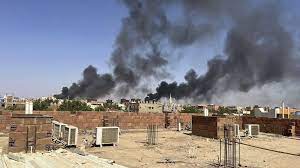The Crisis That Must End-Sudan
As a complex and multifaceted issue, the Sudan crisis has had significant impacts not only on Sudan but also on the larger African continent. The crisis has been characterized by political instability, economic hardship, and ongoing conflict, including the recent conflict in the Tigray region of Ethiopia.
The Sudan Crisis began in 2018 with protests against President Omar al-Bashir, who had been in power since 1989. The protests ultimately led to al-Bashir's ouster in April 2019, but the country has struggled with political instability and economic challenges since then.
One of the impacts of the Sudan Crisis has been the displacement of millions of people, both within Sudan and across its borders. For instance, tens of thousands of people have been killed, and millions have been forced to flee their homes due to violence and persecution. This has created significant humanitarian challenges, including a shortage of food, water, and medical supplies.
In addition, the Sudan Crisis has contributed to the ongoing conflict in neighbouring countries, particularly in Ethiopia's Tigray region. Sudan has been accused of supporting the Tigray People's Liberation Front (TPLF), which has conflicted with the Ethiopian government since November 2020.
Across the region, the Sudan crisis has also had a significant economic impact. Sudan's economy has been severely affected by the crisis, with inflation reaching over 400% in 2020. This has had ripple effects across the region, particularly in neighbouring countries like Ethiopia, South Sudan and Egypt. Many people struggle to access basic goods and services due to supply chain disruptions in trade and commerce. Additionally, it has also exacerbated the poor service delivery by the Sudan government in the areas of education, healthcare and other social amenities.
Efforts to end the conflict and promote peace and stability in Sudan must be prioritised, especially the well-being of the people of Sudan, and work to address the underlying political and economic factors driving the conflict. Because this crisis is complex and multifaceted, the issue requires a multifaceted approach to finding a lasting solution. We recommend the following pathways:
Political negotiations and a ceasefire: A key step towards resolving the Sudan conflict is to engage in political negotiations between the government and opposition groups. An immediate ceasefire is critical for negotiation. A comprehensive peace agreement that addresses the root causes of the conflict can prevent further violence and displacement. Such a negotiation is better led by independent bodies appointed by the African Union.
A country at war cannot raise resources to support its people, just like the world did to the Ukrainians. International support is ideal. International support is crucial to resolving Sudan's conflict. The global community can provide political and financial support to help the Sudanese government address the underlying causes of the conflict, such as poverty and inequality. However, political support should not favour any side.
Humanitarian assistance: Providing assistance and support to the millions of people affected by the conflict is critical. This includes guaranteeing access to food, water, shelter, and healthcare, and protecting vulnerable populations such as women and children. This should also be coupled with providing humanitarian corridors and a ceasefire to access affected people.
Economic reform: Economic reforms are necessary to address the root causes of Sudan's conflict. The Sudanese government can undertake economic reforms that prioritize job creation, poverty reduction, and equitable resource distribution.
Transitional justice: A comprehensive transitional justice process can help address the legacy of human rights abuses during the conflict. This can include truth-telling, reparations for victims, and holding accountable those responsible for atrocities.
In conclusion, addressing the complex and multifaceted Sudan crisis requires a coordinated and comprehensive approach that addresses the root causes of the conflict. This approach prioritizes the needs of the Sudanese people and engages with the international community for support.
By Mwaze Alfred, A Conflict Researcher
EM Collaborator from Zambia



